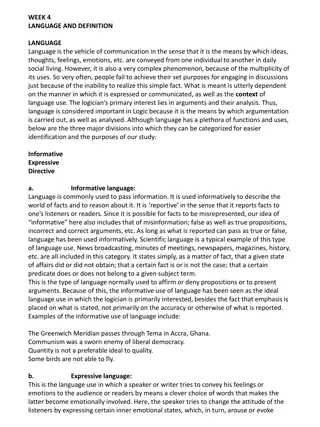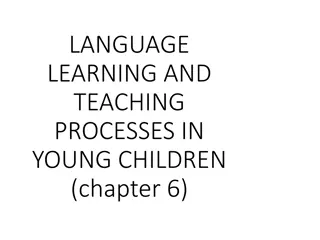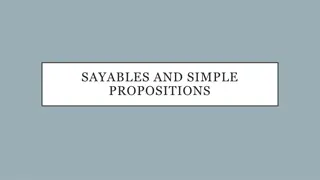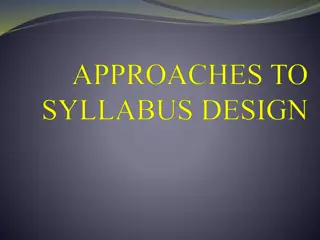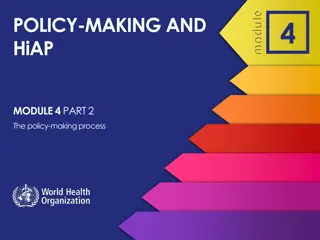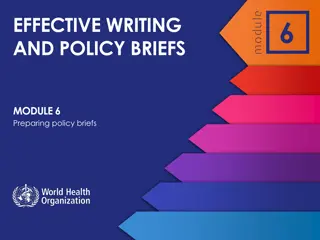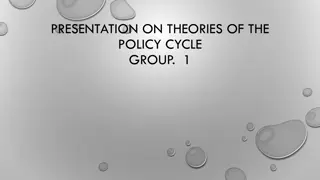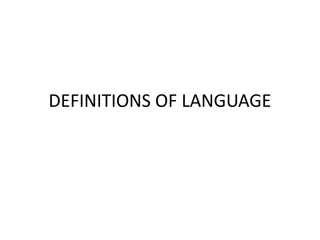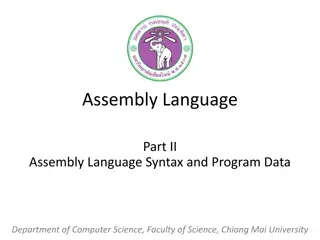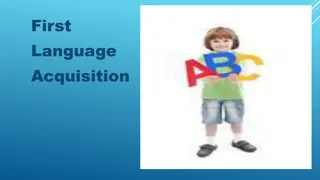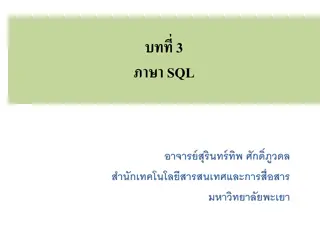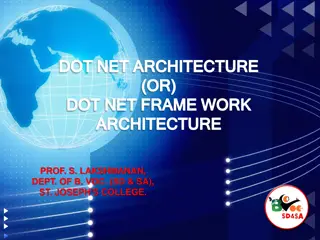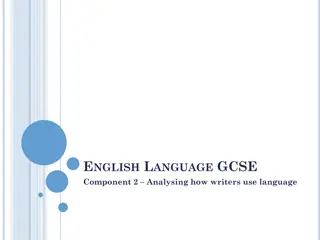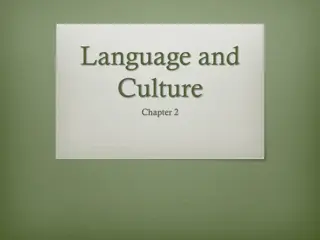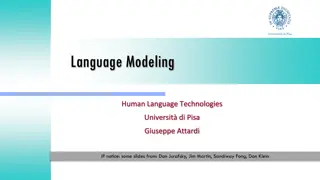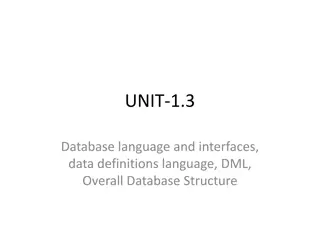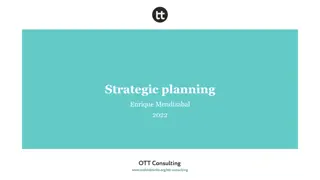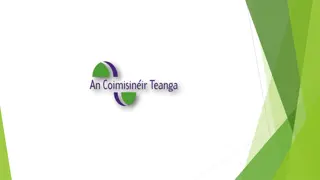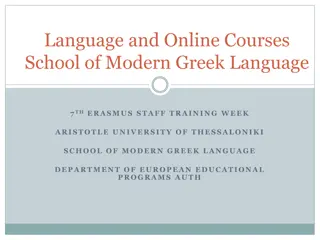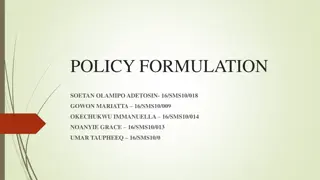Career Opportunities and Challenges in Translation & Interpreting Pedagogy Post-Pandemic
The APTIS 2022 conference explores new avenues in Translation and Interpreting (T&I) pedagogy amidst a changing landscape. Dr. Bego A. Rodriguez highlights emerging roles for T&I graduates. The context reveals a decline in language learning in the UK, impacting the Language Service Industry. The UK'
0 views • 13 slides
Language Study Community – Enhance Your Language Skills
Joining a Language Study Group is a fantastic way to take your language learning to the next level. By leveraging the power of Group Study, you can immerse yourself in the language, enhance your understanding, and build confidence in your speaking abilities. Read full article \/\/explainlearning.com
1 views • 3 slides
Academic Language Demands and Supports in Instructional Planning
Academic Language Demands and Supports are crucial in educational settings to ensure comprehension and usage of language by students. This content discusses embedding language demands in lesson plans, providing language supports, and peer review activities to enhance academic language skills. The fo
6 views • 10 slides
The Significance of Media in Language Learning
Media plays a crucial role in language learning by raising awareness of the ideology behind linguistic structures and providing valuable information on society and culture. Linguists are drawn to media language for research purposes and to understand its impact on language use and attitudes. Media s
12 views • 5 slides
Understanding Translation: Key Concepts and Definitions
Translation involves transferring written text from one language to another, while interpreting deals with oral communication. Etymologically, the term "translation" comes from Latin meaning "to carry over." It is a process of replacing an original text with another in a different language. Translat
11 views • 76 slides
Language and Communication in Society: Understanding Interactions
Explore the intricate relationship between language and society through lectures focusing on language in interaction, power dynamics, language contact and change, public space discourse, linguistic landscaping, and more. Delve into the shift from structural linguistics to societal communication, red
6 views • 28 slides
HCBS Advisory Committee August 2023 Summary
The HCBS Advisory Committee's August 2023 meeting covered updates on upcoming policy and procedure changes, feedback on remote supports and respectful language, and addressing questions from attendees. Key topics included ICF-IID Level of Care Determination Policy, Language Access Policy, Case Trans
0 views • 12 slides
Understanding Language: Informative, Expressive, and Directive Uses
Language serves as a vital medium for communication, allowing the conveyance of ideas, thoughts, and emotions. It is a complex phenomenon with diverse uses. This text delves into the three major divisions of language use - informative, expressive, and directive. Informative language conveys facts, w
4 views • 6 slides
Language Learning and Teaching Processes in Young Children
Development of language in young children is influenced by various factors such as their cultural and linguistic environment, unique characteristics, and interactions with adults. Optimal language development requires language stimulation from the environment. Varied cultural practices impact langua
1 views • 51 slides
Understanding Language in Stoicism: Significance and Corporeality
Language in Stoicism plays a crucial role in the process of assenting to impressions by focusing on corporeality, reason, and truth. It distinguishes between the mundane vocal sounds, articulated speech, and significant language to convey meanings effectively. The significance of language lies not i
2 views • 13 slides
Understanding Language Teaching Syllabus: Integration, Theory, and Approaches
Language Teaching Syllabus involves the integration of subject matter and linguistic elements, guided by theories of language and learning. Various approaches like Grammatical, Situational, Communicative, and Analytic are used to structure syllabi. Breaking language into parts aids in sequential lea
1 views • 28 slides
Understanding Policy-Making Process for Health Improvement
Policy-making involves defining policy, recognizing its complex nature, identifying windows of opportunity, and framing health issues. The policy-making cycle includes stages like agenda setting, formulation, and implementation. Alignment of problems, policies, and politics is crucial for effective
1 views • 12 slides
Exploring Language and Communication Through a Short Film
In this lesson, students will watch a 10-minute short film titled "The Most Beautiful Thing" by Cameron Covell. They will reflect on the value of learning another language, analyze how facial expressions and body language convey emotions, and develop empathy towards those facing language barriers or
0 views • 29 slides
Effective Writing and Policy Briefs: Enhancing Impact in Policy-making
A policy brief is a compelling document designed to influence decision-makers by outlining policy alternatives and courses of action. Discover the value of policy briefs, effective characteristics, and strategies for agenda setting and policy formulation in this comprehensive module.
1 views • 22 slides
Understanding Theories of the Policy Cycle in Policy Analysis
The policy cycle theory describes the evolution of policy issues from inception to evaluation, impacting scientific research and policy formulation. It outlines stages from the 1950s, influenced by Lasswell's seven-stage model, serving as a framework for organizing policy processes. Despite the line
3 views • 30 slides
Various Definitions of Language Throughout Linguistic History
Different linguists and scholars have offered various definitions of language over time. Sapir (1921) emphasized language as a method of communicating ideas, emotions, and desires through voluntary symbols. Bloch and Trager (1942) focused on the social aspect of language as a system of vocal symbols
1 views • 12 slides
Introduction to Assembly Language Syntax and Program Data
Learn about the syntax of assembly language and how data, variables, and constants are used in programming. Explore the basic instructions and the translation of high-level language into assembly language. Discover the role of an assembler in translating assembly language programs into machine langu
4 views • 36 slides
Enhancing Language Learning Across the Curriculum in B.Ed. 1st Year Course
Language Across the Curriculum (LAC) emphasizes that language learning should occur across all subjects, not just in language classrooms. It highlights the importance of incorporating language development into every learning activity, fostering multilingualism in schools. Language plays a crucial ro
2 views • 34 slides
Understanding First Language Acquisition Process
First language acquisition is the process through which humans develop the capacity to perceive, comprehend, and effectively use language to communicate. It primarily focuses on infants acquiring their native language. Basic requirements, caregiver speech features, and the acquisition schedule play
0 views • 19 slides
Comprehensive Overview of SQL Commands and Language Categories
In this detailed guide, you will learn about Structured Query Language (SQL) including its various commands such as Data Definition Language (DDL), Data Manipulation Language (DML), Data Control Language (DCL), and Transaction Control Language (TCL). Explore how SQL is used in Database Management Sy
0 views • 15 slides
Speech and Language Developmental Milestones: A Bilingual/Multilingual Perspective
Speech and language developmental milestones are crucial for children, regardless of their home language. These milestones encompass receptive language, expressive language, pragmatics, and articulation and phonology. Understanding how a child hears and talks from birth to one year is essential, as
1 views • 23 slides
Understanding .NET Framework Architecture and Common Language Runtime
This content delves into the intricacies of .NET architecture, highlighting its structure, common language runtime, and key components such as Common Type System (CTS) and Common Language System (CLS). It explains how .NET supports multiple languages, facilitates cross-language interoperability, and
0 views • 13 slides
Challenges in Policy Implementation and Lessons Learned
The content discusses the challenges faced in policy implementation, focusing on the gap between policy design and execution. It highlights key steps in policy-making, reasons for implementation failures, and factors influencing successful policy outcomes. Examples from Zambia's National Science and
0 views • 14 slides
Analyzing Writer's Language Use in English Language GCSE Component 2
In English Language GCSE Component 2, students learn to analyze how writers use language. The learning objective focuses on commenting, explaining, and analyzing language use with relevant subject terminology. The exam assesses students on their ability to interpret and explain a writer's thoughts,
0 views • 12 slides
Language and Culture Reflections: Diversity in Linguistic Emphasis
Exploring the correlation between language and culture, this content delves into how various languages reflect cultural values and priorities. Through examples like the Inuit language with rich vocabulary for snow and seals, the Shinzwani culture's unique word for mother and aunt, and the evolving l
0 views • 50 slides
Understanding Language Modeling in Human Language Technologies
Exploring the concepts of language modeling in human language technologies, this presentation delves into N-grams, the chain rule of probability, evaluation metrics like perplexity, smoothing techniques such as Laplace, and the goal of assigning probabilities to sentences. It covers applications lik
1 views • 81 slides
Introduction to Language Technologies at Jožef Stefan International Postgraduate School
This module on Knowledge Technologies at Jožef Stefan International Postgraduate School explores various aspects of Language Technologies, including Computational Linguistics, Natural Language Processing, and Human Language Technologies. The course covers computer processing of natural language, ap
0 views • 27 slides
Exploring Sociolinguistics: Language Variation and Social Factors
Sociolinguistics delves into the study of language variation influenced by social factors, examining the relationship between language and its social context. It explores various aspects like standard pronunciation, language choice, speech acts, language components, language variety, and factors suc
0 views • 73 slides
Understanding Assembly Language Programming for Computing Layers
Assembly language is a low-level programming language that enables direct interaction with a computer's hardware components. This content explores the fundamentals of assembly language, the relationship between human-readable machine language and binary code, an assembly language program for multipl
0 views • 31 slides
Challenges Faced in Prioritizing Foreign Language Education
Throughout Europe, foreign language education is emphasized early on in schools, with a high percentage of nations focusing on language learning. In contrast, the United States lags behind in prioritizing foreign language programs in K-12 education, influenced by cultural factors and a lack of aware
0 views • 16 slides
Database Language and Interfaces Overview
A database management system (DBMS) requires appropriate languages and interfaces to handle queries and updates for data manipulation and control. This includes Data Definition Language (DDL), Data Manipulation Language (DML), Data Control Language (DCL), and Transaction Control Language (TCL). Each
0 views • 12 slides
Theories and Strategies for Effective Policy Change
Explore the intricacies of strategic planning, outcome mapping, change theories, policy windows, and more in the realm of policy entrepreneurship and advocacy. Learn about key concepts such as large leaps theory, policy streams theory, and how think tanks can influence policy decision-making process
0 views • 43 slides
Understanding Language Anxiety in Foreign Language Learning and Teaching
Explore the impact of language anxiety on students and teachers in foreign language learning and teaching contexts through insights from Dr. Christina Gkonou's research. Delve into the theoretical background, implications for language education, and real-life experiences shared at the Essex Language
0 views • 25 slides
Strengthening Language Rights: Official Languages (Amendment) Act 2021
The Official Languages (Amendment) Act 2021, enacted to strengthen the language rights of Irish speakers, introduces provisions for public bodies' communications in official languages. Section 10A requires public bodies to allocate a minimum of 20% of advertising in Irish and 5% of ad expenditure in
0 views • 49 slides
Understanding Language Development in Children with Assistive Technology
Explore the nuances of speech vs. language development in children, focusing on the benefits of using alternative language modes such as signs, pictures, and gestures. Delve into the definition of language and speech, set the stage for discussions around assistive technology, and learn about the imp
0 views • 40 slides
School of Modern Greek Language: Courses, Seminars, and Assessment Overview
Explore the School of Modern Greek Language at Aristotle University of Thessaloniki offering language courses, seminars for teachers, and assessment exams. Founded in 1970, the school provides a multicultural environment for students worldwide, emphasizing Greek culture and offering a variety of lan
0 views • 17 slides
Morality in UK Drug Policy: Policy Constellations Analysis
Morality plays a significant role in shaping drug policy in the UK, as revealed by the research conducted by Professor Alex Stevens at the University of Kent. The study investigates the moral commitments underlying different policy positions in UK drug policy debates, highlighting five ethico-politi
0 views • 19 slides
Industrial Policy: The Old and The New - Insights by Dani Rodrik
Industrial policy, as presented by Dani Rodrik in May 2019, emphasizes the importance of empirical work, the differences between old and new policies, and the targets industrial policy should focus on. The theoretical arguments for industrial policy highlight market imperfections, learning spillover
0 views • 26 slides
Australia's Foreign Policy Discourse in Howard's War on Terror
Australian foreign policy under Howard's leadership during the War on Terror was shaped by a unique language and discourse that made it conceivable, communicable, and coercive. The narrative explores the contextual background, theoretical framing, and response to events like 9/11 and Afghanistan, em
0 views • 11 slides
Understanding Policy Formulation: Key Concepts and Approaches
Policy formulation is a crucial step in the policy-making process, involving identifying and crafting policy alternatives to address various issues. This phase requires participants to define policy problems, develop alternatives, and select the most feasible solutions based on criteria such as feas
0 views • 12 slides







